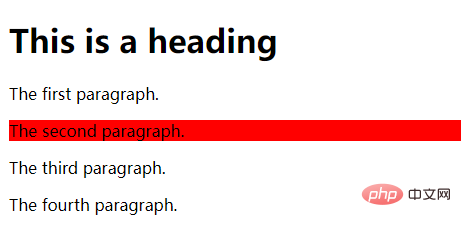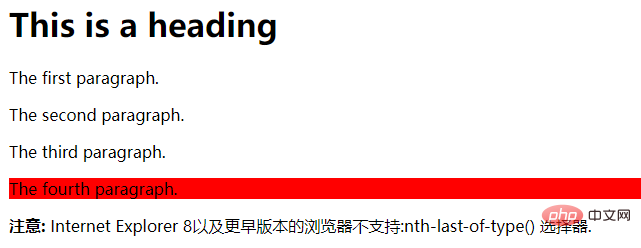nth用法:1、“:nth-child(n)”匹配第n个子元素;2、“:nth-last-child(n)”倒数匹配第n个子元素;3、“:nth-of-type(n)”匹配同类第n个子元素;4、“:nth-last-of-type(n)”。

本教程操作环境:windows10系统、CSS3&&HTML5版本、Dell G3电脑。
css中nth的用法是什么
1、:nth-child(n)
:nth-child(n) 选择器匹配父元素中的第 n 个子元素,元素类型没有限制。
n 可以是一个数字,一个关键字,或者一个公式。
示例如下:
<!DOCTYPE html> <html> <head> <meta charset="utf-8"> <title>123</title> <style> p:nth-child(2) { background:#ff0000; } </style> </head> <body> <h1>这是一个标题</h1> <p>这是第一个段落。</p> <p>这是第二个段落。</p> <p>这是第三个段落。</p> <p>这是第四个段落。</p> <p><b>注意:</b> Internet Explorer 8 以及更早版本的浏览器不支持 :nth-child()选择器.</p> </body> </html>
输出结果:

2、:nth-last-child(n)
:nth-last-child(n) 选择器匹配属于其元素的第 N 个子元素的每个元素,不论元素的类型,从最后一个子元素开始计数。
n可以是一个数字,一个关键字,或者一个公式。
示例如下:
<!DOCTYPE html> <html> <head> <meta charset="utf-8"> <title>123</title> <style> p:nth-last-child(2) { background:#ff0000; } </style> </head> <body> <p>The first paragraph.</p> <p>The second paragraph.</p> <p>The third paragraph.</p> <p>The fourth paragraph.</p> <p><b>注意:</b> Internet Explorer 8 以及更早版本的浏览器不支持:nth-last-child()选择器.</p> </body> </html>
输出结果:

3、:nth-of-type(n)
:nth-of-type(n)选择器匹配同类型中的第n个同级兄弟元素。
n可以是一个数字,一个关键字,或者一个公式。
示例如下:
<!DOCTYPE html> <html> <head> <meta charset="utf-8"> <title>123</title> <style> p:nth-of-type(2) { background:#ff0000; } </style> </head> <body> <h1>This is a heading</h1> <p>The first paragraph.</p> <p>The second paragraph.</p> <p>The third paragraph.</p> <p>The fourth paragraph.</p> </body> </html>
输出结果:

4、:nth-last-of-type(n)
:nth-last-of-type(n)选择器匹配同类型中的倒数第n个同级兄弟元素。
n 可以是一个数字,一个关键字,或者一个公式。
示例如下:
<!DOCTYPE html> <html> <head> <meta charset="utf-8"> <title>123</title> <style> p:nth-last-of-type(2) { background:#ff0000; } </style> </head> <body> <h1>This is a heading</h1> <p>The first paragraph.</p> <p>The second paragraph.</p> <p>The third paragraph.</p> <p>The fourth paragraph.</p> <p><b>注意:</b> Internet Explorer 8以及更早版本的浏览器不支持:nth-last-of-type() 选择器.</p> </body> </html>
输出结果:

(学习视频分享:css视频教程)
 站长资讯网
站长资讯网